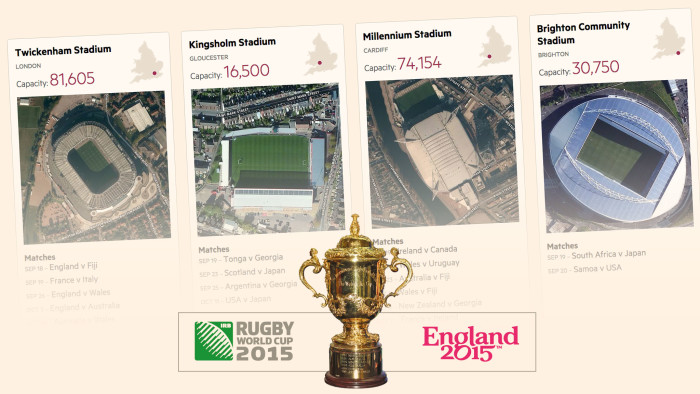Nigel Owens details the on-the-pitch dominance of rugby referees

Roula Khalaf, Editor of the FT, selects her favourite stories in this weekly newsletter.
The rugby referee enjoys a level of respect denied to his football counterpart. He is spared flash-mobbing by angry players and often addressed as “Sir”.
Yet the role still brings closer scrutiny than it once did. This is partly because microphones make the comments of referees audible on television broadcasts and bring their personalities to the fore.
And none more than that of Nigel Owens, who will be going into his third World Cup as the tournament’s senior arbiter, with 63 internationals and numerous other big games on his record.
Owens, 44, is a vivid on-field and on-air presence, distinctive both for his West Walian accent and a gift of repartee with players. This reflects the humour and quick wit associated with his other identities as a bilingual stand-up comedian and TV presenter.
“A quick comeback to a player who is moaning about something can often defuse tension,” he says.
“But it has to arise naturally from the situation. You mustn’t go out there thinking of funny things to say, or say anything which disrespects the player or the game.”
One consequence, he argues, is it can no longer be argued that the best referee is the one who is noticed least. “That might have been the case in the past, but now that we are miked-up, with the idea of explaining decisions and making the game more accessible, people will hear and recognise you.”
That visibility, and audibility, adds to the challenges of a game which is in any case getting harder to referee. “At top level it is faster than it has ever been,” he notes. “The ball stays in play longer and you have to make split-second judgments on incidents which will then be replayed endlessly from the angles provided by 26 cameras and examined mercilessly on social media.”
There are further potential problems in contentious phases of an inherently complex game. Owens points in particular to the so-called contact area — with players battling for possession in loose play — and the perennial perplexities of the scrum. “If you can get those right you are on your way to having a decent game,” he says.
The FT’s guide to the 2015 Rugby World Cup

The big men are back. The world’s best 620 players (minus the infirm and overlooked) have assembled across England and Wales to contest the eighth world championship. View our interactive guide.
Read more
Add being the target of homophobic abuse, as Owens — who came out in 2007 — was at Twickenham last year and you would think he had every excuse for losing the enthusiasm for rugby evident over those television microphones.
While disappointed by the Twickenham incident, he was greatly encouraged by the reaction to it. “It would be unfair to single Twickenham out,” he says. “It might happen at any stadium, and there should be huge credit to the people who spoke out about it and the RFU for taking action.
“They’re the people who made a difference, by not standing by and letting it happen.” The Rugby Football Union slapped a ban of two years from Twickenham on two fans plus a £1000 payment each to a charity of Owens’ choice.
His passion for the game is evidently undimmed. He talks of the possibility of refereeing at a fourth World Cup in Japan in 2019. On weekends when he is not on duty at a big game, he is likely to be found contributing to rugby’s future by taking charge of under-12 matches in West Wales.
A third World Cup finds him just as excited as he was before his first, in France in 2007. “There is always that sense of excitement. And this time there is the added element of it being at home in England and Wales and a feeling that, more than any other tournament since the first in 1987, there are a number of teams who have real hopes of winning it.”
The pool stages will find him in charge of three matches — a clash of ferociously physical cultures in Tonga v Georgia and two potential pool deciders, South Africa v Scotland and Ireland v France.
“I’ll prepare in the same way as I would for any other match,” he says, at the same time acknowledging that World Cup matches do bring their own challenges.
“You are aware that decisions you make might lead a team being eliminated. If they’re the right decisions, that’s fine and as it should be. But it does place extra pressure on you.”
Referees, like players, have ambitions. Given his record and standing, Owens probably has a better chance than any other British participant — player or referee — of playing an active part, rather than spectating, when the final takes place at Twickenham on October 31.
“As a referee you want to be at the World Cup, he says. “And if you get there you want to referee the final. It’s no different to being a player.”
Such an achievement would be the culmination (although far from the finale) of a distinguished refereeing career. But cherished as the ambition is, there is one thing for which he would readily sacrifice it. Nobody nowadays referees their own country in any rugby international, least of all a World Cup final.
A Welsh team success would mean frustrated ambition for him, but he has no doubt about his priorities. “Nobody would be more delighted than me if Wales got to the final,” he says.
“I’d like to think that everyone who plays for Wales thinks of the team before himself and as a referee it is the same — individual aspirations come second.”
Comments